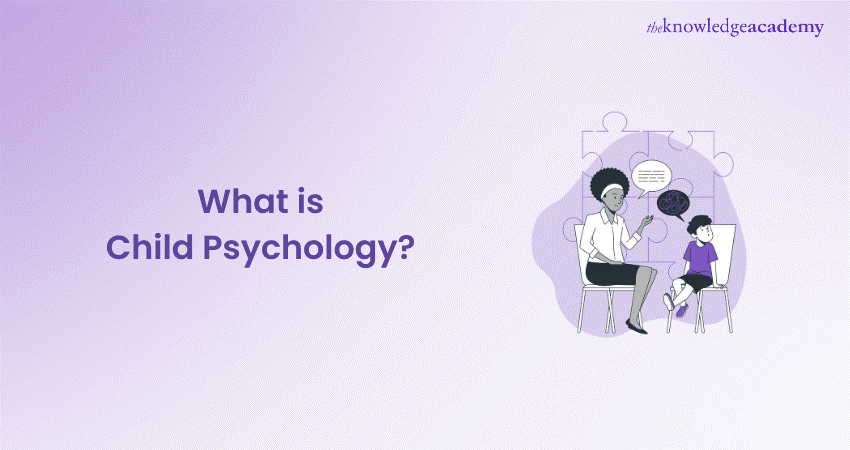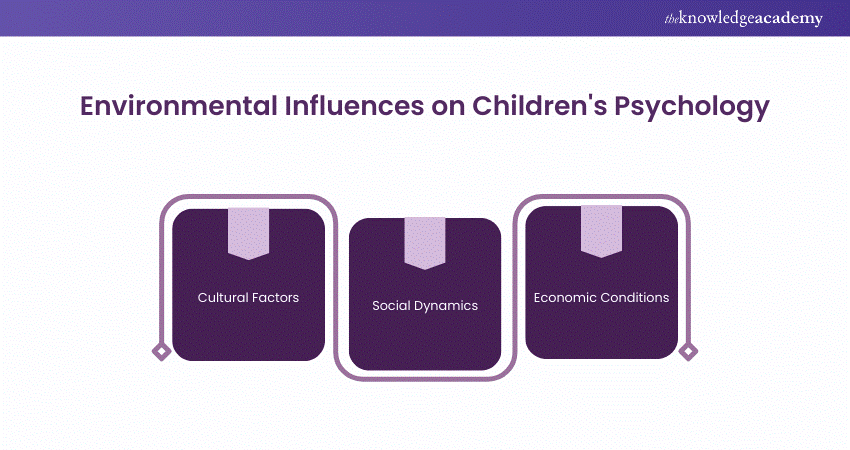We may not have the course you’re looking for. If you enquire or give us a call on + 1-866 272 8822 and speak to our training experts, we may still be able to help with your training requirements.
We ensure quality, budget-alignment, and timely delivery by our expert instructors.

The journey of brain development begins even before birth, setting the stage for a lifetime of growth. From prenatal stages to early childhood, the brain undergoes rapid transformations that shape cognitive and emotional development. Child Psychology helps us understand how these early processes influence key developmental milestones, ensuring children stay on track and adapt to their surroundings.
Every child is unique, and some may need extra support to reach these milestones. Child Psychology provides the guidance and resources necessary to help children achieve their developmental goals, allowing them to grow and thrive alongside their peers. Dive into this blog to explore the evolution of Child Psychology and understand its crucial role in Child Development.
Table of Contents
1) Introduction to Child Psychology
2) Evolution of Child Psychology
3) Why is Child Psychology Important?
4) Environmental Influences on Children's Psychology
5) Child Psychology Influencing Factors
6) Conclusion
Introduction to Child Psychology
Did you know that early childhood and the developmental stages of a child have lifelong effects on the human mind and behaviour? Disparities during childhood development can hamper how we function as adults. But how can they be rectified? With the help of Child Psychology!
Child Psychology is the study of the conscious and subconscious functioning of the child's mind and how they interact with their environment. It leans on the pillars of developmental models set by many respected Psychologists.
These developmental models map out the natural developmental milestones everyone is most likely to cross in early childhood. In a way, they act as a framework with which to cross-check. When a child is deviating from their path of development, simple rectifying exercises are put into action to bring them back on track.
Evolution of Child Psychology
A child's mind used to be a mystery before Psychologists like Jean Piaget, Erik Erikson, the infamous Sigmund Freud, and his daughter Ann Freud spent hours researching it and came up with theories and interpretations to help explain a child's mind.
These Psychologists individually formulated seven significant developmental theories to assist our understanding of children’s growth. The seven theories are:
1) Psychosexual Developmental Theory by the famous Sigmund Freud believed that mental illnesses were a result of disturbances in the development during childhood.
2) Psychosocial Developmental Theory by Erik Erikson was influenced by Freud's initial theory but focused more on eight significant stages. He shed light on potential developmental crises that may occur and pose as a major turning point in the individual's life.
3) Behavioural Child Development Theories, the collective of the works of John B. Watson and B.F. Skinner concentrated more on the behaviour and learning of the child and believed that the child's development was a result of their environment.
4) Cognitive Developmental Theory by Jean Piaget divided the child’s development into four stages describing what development should look like in a child based on their age.
5) Attachment Theory by John Bowlby, that emphasised how the relationships the child had with their caregiver effects their personality development.
6) Social Learning Theory by Albert Bandura emphasised the role observation plays in the child’s development. How the child learns social cues based on what he sees adults do.
7) Sociocultural Theory by Lev Vygotsky acknowledges how the child learns and develops based on his sociocultural settings. The experience the child gets in the environment by picking up skills and knowledge apart from what's formally given to them.
Learn to manage stress and build resilience with our Handle Stress And Develop Your Resilience - register now!
Why is Child Psychology Important?
Parents and educators may have a hard time understanding the needs of a child who is rather unique from others their age. Child Psychology can not only aid them but also help them prevent potential disturbances that may develop in the child when they grow into adults. As Freud's studies suggest, mental illnesses result from disturbances during childhood development.
If cared for in the right way during early childhood and adolescence, you can prevent the children of tomorrow from suffering from depression, anxiety, personality disorders and, most importantly, trauma disorders. Being unique may often result in a rather traumatic experience for the individual. How their environments react to them may leave long-lasting faulty perceptions of the world.
Environmental Influences on Children's Psychology

A common factor most Child Psychologists highlighted in their studies was the role the environment plays in the child’s development. The environment plays a big role in building the child’s perceptions and, in turn, their personalities. Here are the environmental factors that act as building blocks in a child’s mind.
1) Cultural Factors
What seems appropriate in one culture might seem absurd in another. The cultural background the child grew up in makes a big difference to their perception. So, it is very important to keep in mind the roots when assessing a child’s behaviour.
Example: A girl who has migrated from a rather conservative culture that doesn't allow women to talk to men might show signs of discomfort when spoken to by a man. This may seem abnormal in the West, but it is the norm in the place she calls home.
2) Social dynamics
The child's role in their social environment also builds elements of their personality. Alfred Adler's theory suggests that the birth order of children plays a vital role in defining their personalities. The older child is often more responsible and caring, while the middle child may feel neglected and have attention-seeking tendencies. The youngest is likely to be pampered and protected, establishing a sense of privilege.
Example: Being entrusted with responsibilities early in life as the oldest child, feeling responsible for their sibling, one might start to act as a parent to their younger siblings in the absence of their parents.
3) Economic conditions
Have you heard the phrase “money talks?” The financial situation a child grows up under also plays a part in their development. A child growing up with abundance in a well-to-do family may not fully understand the value of a slice of bread. However, a child who grew up on the streets fending for themselves would likely value a slice of bread a lot. This may sound silly, but it shows the contrast in perceptions.
Example: A child who joined in a private school through a scholarship gets mocked by the other students for wearing old and outdated clothes that are out of fashion. They may not understand how insensitive it is due to the lack of perception of the child with the scholarship.
Aid in creating a safe space for everyone around you with our Mindfulness Training - sign up now!
Child Psychology Influencing Factors
Child Psychology covers a diverse array of topics, ranging from genetic influences on behaviour to social pressures impacting development. Key areas of study in Child Psychology include:
1) Cognitive development
2) Peer relationships
3) Gender roles
4) Genetics
5) Language
6) Personality development
7) Prenatal development
8) Sexual development
Child Psychologists might explore which childcare settings and practices promote optimal psychological outcomes, or they might work with children to foster growth mindsets.
Conclusion
In this blog, we explored the world of a child’s mind by giving you insights into Child Psychology and its importance. Additionally, we guided you through a brief of the seven significant developmental theories and what they imply. Further, the environmental factors that play a role in the child’s development were explained with simple examples.
Learn how you can prevent psychological distress that can lead to extreme adversities. Sign up for our Prevention Psychology Training - register now!
Frequently Asked Questions
What is the aim of Child Psychology?

Child Psychology aims to identify, acknowledge and rectify child development disturbances. Apart from this, it aims to create a safe space for children who with unique needs and aids them in any way possible.
What age does Child Psychology start?

Contrary to popular belief, Child Psychology states that at conception, prenatal disturbances also play a big part in the child’s development overall. It starts at conception and ends after adolescence.
What are the other resources and offers provided by The Knowledge Academy?

The Knowledge Academy takes global learning to new heights, offering over 3,000 online courses across 490+ locations in 190+ countries. This expansive reach ensures accessibility and convenience for learners worldwide.
Alongside our diverse Online Course Catalogue, encompassing 19 major categories, we go the extra mile by providing a plethora of free educational Online Resources like News updates, Blogs, videos, webinars, and interview questions. Tailoring learning experiences further, professionals can maximise value with customisable Course Bundles of TKA.
What is Knowledge Pass, and how does it work?

The Knowledge Academy’s Knowledge Pass, a prepaid voucher, adds another layer of flexibility, allowing course bookings over a 12-month period. Join us on a journey where education knows no bounds.
What are related Health & Safety courses and blogs provided by The Knowledge Academy?

The Knowledge Academy offers various Health & Safety Courses, including Advance First-Aid training, Active and healthy lifestyle training and Counselling Masterclass. These courses cater to different skill levels, providing comprehensive insights into What is Yoga .
Our Health & Safety blogs cover a range of topics related to Stategic Leadership, offering valuable resources, best practices, and industry insights. Whether you are a beginner or looking to advance your Project Management skills, The Knowledge Academy's diverse courses and informative blogs have you covered.
Upcoming Health & Safety Resources Batches & Dates
Date
 Handle Stress and Develop Your Resilience
Handle Stress and Develop Your Resilience
Fri 13th Jun 2025
Fri 8th Aug 2025
Fri 26th Sep 2025
Fri 21st Nov 2025
Fri 27th Feb 2026
Fri 10th Apr 2026
Fri 5th Jun 2026
Fri 28th Aug 2026
Fri 25th Sep 2026






 Top Rated Course
Top Rated Course



 If you wish to make any changes to your course, please
If you wish to make any changes to your course, please


